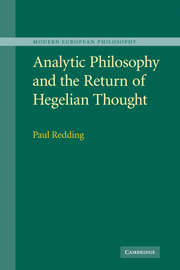Book contents
- Frontmatter
- Contents
- Acknowledgements
- Introduction: analytic philosophy and the fall and rise of the Kant–Hegel tradition
- 1 McDowell, Sellars and the myth of the perceptually given
- 2 Brandom, Sellars and the myth of the logical given
- 3 Individuation and determinate negation in Kant and Hegel
- 4 The Kantian route to Hegel's inferentialism
- 5 Aristotelian Phronesis and the perceptual discernment of value
- 6 Kant, Hegel and the dynamics of evaluative reason
- 7 Hegel and contradiction
- 8 Hegel, analytic philosophy and the question of metaphysics
- Bibliography
- Index
1 - McDowell, Sellars and the myth of the perceptually given
Published online by Cambridge University Press: 22 September 2009
- Frontmatter
- Contents
- Acknowledgements
- Introduction: analytic philosophy and the fall and rise of the Kant–Hegel tradition
- 1 McDowell, Sellars and the myth of the perceptually given
- 2 Brandom, Sellars and the myth of the logical given
- 3 Individuation and determinate negation in Kant and Hegel
- 4 The Kantian route to Hegel's inferentialism
- 5 Aristotelian Phronesis and the perceptual discernment of value
- 6 Kant, Hegel and the dynamics of evaluative reason
- 7 Hegel and contradiction
- 8 Hegel, analytic philosophy and the question of metaphysics
- Bibliography
- Index
Summary
Few works of analytic philosophy published in the last few decades have attracted as much attention as John McDowell's Mind and World. Regarded in terms of the range of interest generated, McDowell's book might be compared with Richard Rorty's Philosophy and the Mirror of Nature, the influence and challenge of which McDowell had acknowledged. Many of the things typically said in praise of Mind and World – its way of situating central issues from recent analytic philosophy within the historical big picture, and the suggestive bridges it throws over the abyss separating professionalized Anglophone philosophy from works within the more historically reflective ‘continental’ tradition – were said about Rorty's book after its appearance in 1979. On the other hand, Rorty's book clearly touched a nerve, and to a considerable extent polarized the Anglophone philosophy profession, and similarly McDowell's has not entirely escaped the negative reaction that Rorty's attracted. From the orthodox analytic point of view, perhaps the claim most difficult to digest in the whole book is a remark, made almost as an aside at the end of Lecture II, where McDowell appeals to Hegel as offering a way beyond one of the intractable problems of late twentieth-century analytic philosophy.
In this chapter, after sketching McDowell's diagnosis of the problems of analytic philosophy, I reconstruct his path to Hegel by way of Kant, mostly in the company of his former colleague Gareth Evans, but ultimately parting ways.
Information
- Type
- Chapter
- Information
- Analytic Philosophy and the Return of Hegelian Thought , pp. 21 - 55Publisher: Cambridge University PressPrint publication year: 2007
